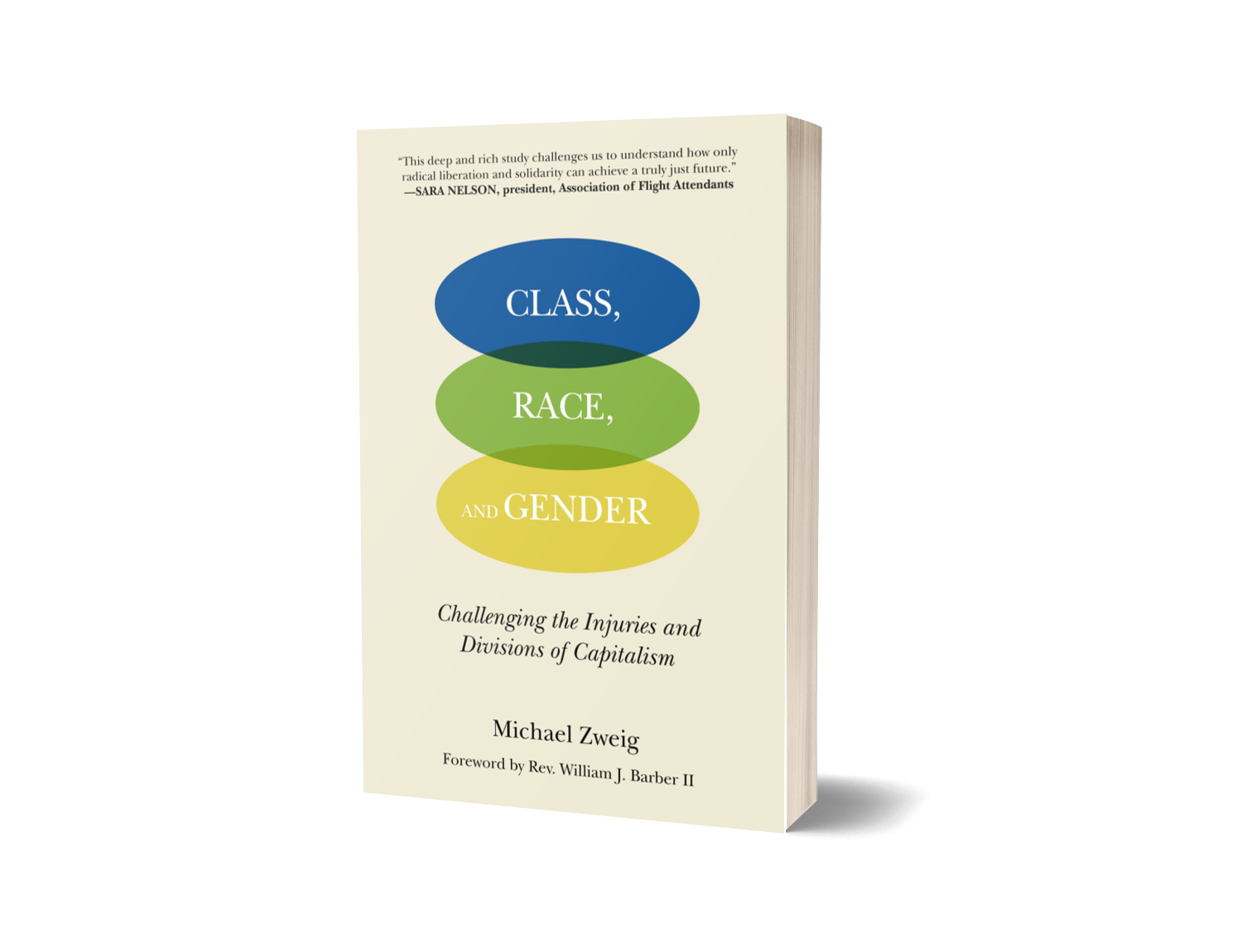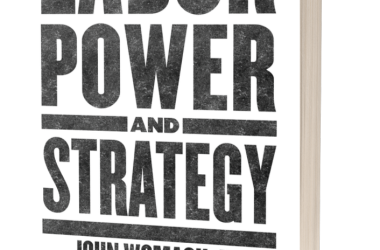By Jeff Crosby
Journal of Working-Class Studies
Zweig, Michael (2023) Class, Race, and Gender: Challenging the Injuries and Divisions of Capitalism. PM Press.
This is a stunningly ambitious book. In just over 200 pages Michael Zweig takes on economic concepts like class formation, commodity production, surplus, and the labor theory of value, and also dialectical and historical materialism, religion in social movements, individualism, reform and revolution, and more. He identifies the “tension between class and ‘identity politics’” as “perhaps the most important and most difficult dynamic that progressive politics has to navigate.” (p. 52) Understanding how capitalism works “gives activists and organizers a better grounding for cooperation across what are now too often isolated issue-based campaigns.” (p. 133) As someone who has spent a lifetime in the labor movement during the period that bridges the Black Powerand the Black Lives Matter uprisings, I agree with him on both counts. He introduces what he calls “threshold concepts” and argues that we need “abstract thinking,” or theory, to understand the world and overcome capitalism. As someone who dropped out of school thinking I could learn everything on the street, and later went back to school and got a master’s degree at age 59, this certainly speaks to my experience as well. Perhaps the biggest strength of the book is its ability to present many complex notions in clear essential language. Explaining that knowledge is a process, he says: “All knowledge is tentative and transitory, subject to elaboration or radical change depending on future turns in the process. Knowledge arises from a process that combines activity and thinking…. if the outcome is unexpected, we have to go back and adjust the theory to account for the new observations.” (p. 61) This is a Marxism fully shed of dogma, in language useful for study with people who did not get radicalized in college classes.Those who have followed Michael Zweig’s previous work will recognize themes he revisits. He clarifies class as a social relationship, defined by power on the job and in society, and tips his hat to the cultural wing of working-class studies: “classes are produced and reproduced as well in a much more complex network of cultural and political relationships that tend to reflect relative power in production but are not directly tied to it.” We confront the capitalist class, not “the rich.” There is no separate underclass of the poor: poverty is something that happens to working-class people. Zweig again demands that leftists take a holistic view of religion’s impact on our movements. He traces the roots and power of liberation theology in different religions (not just Catholicism). He cites the full text of Marx’s famous quote that “religion is the opium of the people.” Marx continued, religion is “the sigh of the oppressed creature, the heart of a heartless world, and the soul of soulless conditions.” Religion’s power to relieve the pain of our peoples and motivate good works is confirmed with my work with mainstream churches, temples of different faiths, as well as Evangelical and Pentecostal folks. Their beliefs and social practice do not deserve the often dismissive attitudes of the left, and can be an antidote tothe fascist core of white Christian nationalism. Young activists are often clear on issues of white privilege, which Zweig calls “a fact of life,” the systemic relative advantages enjoyed by white people, including workers. But they are less clear on the movements of oppressed peoples in the US for freedom or self-determination as a social movement both independent and intertwined with others. Critically, Zweig addresses both sides of racial and national oppression. “We cannot rightly say that one struggle is central and others subordinate or peripheral .. . Racism and male supremacy existed before capitalism. They do not require capitalism for their perpetuation . . . Each of these movements demands its autonomy.” White supremacy will not just go away through class struggle towards common goals, and a rising tide will not lift all boats. He calls for extensive education of workers in the history of white supremacy and explicit discussion and struggle in the course of day-to-day fights to root out or at least mitigate its impact. I have seen this help in my labor council, where a small part of the monthly agenda used portions of an anti-racist curriculum Bill Fletcher prepared that not only raised the level of understanding and resistance to white supremacy, but helped position us to fight anti-gay and anti-trans hatred as well.I am grateful to Zweig for identifying the middle-class condescension towards white working-class people. It is grating to see young white activists, especially those from elite backgrounds or universities, go on about the backwardness of white workers. The goal of the education he proposes is not to create a guilt trip, but to unify people in common struggle by lifting the veil on the exploitation of all workers. The stereotyping of white workers as uniformly backward may comfort certain middle-class or academic leftists, but it is destructive to that process. Trump and the neo-Confederates take advantage of that. You don’t hear much about the working class from the pundits of CNN and MSNBC (the “Channel of Smug”). To hear the words “working class,” sadly, you have to turn to Fox. His description of the racial bias of the National Labor Relations Act is accurate, as far as it goes. But the racist elements of the Act –the exclusion of organizing rights for domestic and agricultural workers and ceding implementation of the Act to the(Jim Crow and lynch-rule) states–was not simply an accommodation of the Southern Democratic racists whose votes were needed to pass the bill.
The American Federation of Labor, dominated by the explicitly white supremacist building trades and rail unions,threatened Senator Wagner to defeat the bill entirely if he did not remove the anti-discrimination language that did not become law until the 1964 Civil Rights Act, 30 years later.The analysis of the impact of gender in Race,Class and Genderseems inadequate. While there is consistent mention of the woman’s movement and LBGQT rights throughout, the analysis of gender in Chapter 9 is largely limited to the exploitation of women workers and their fight for inclusion in the labor movement. And Chapter 9’s “Race and Gender in Class Society” becomes “Navigating Race and Class” in Chapter 10.
The criticism here is of what is omitted, not what is presented. In fairness, there is only so much ground you can cover in 200 pages. But issues of race are dealt with in a complex and thorough way. No clear-headed person can claim to understand where thecurrent new analyses and social practice of organizing around gender will end up. But leaving out discussion of the “Me Too” movement or the impact of anti-trans organizing by the Right is a weakness. There are practical contradictions within our movements in responding to economic and gender oppression. As one older organizer grumbled, “I want to organize a union, and all they want to do is talk about pronouns.” Or as a progressive working-class guy complained. “This pronoun stuff is just another way to make us feel stupid.” The visceral fury with which the New Confederacy will defend patriarchy and their laser focus on anti-trans hatred is an indicator of where they see a weakness in our front, and dictates this cannot be underemphasized. As Trump advisor Steve Bannon put it, “The path to save the nation is simple. It is going to go through the school boards.” That said, this is a very useful book. I have used Zweig’s classic Working-Class Majoritywith the communities where I have lived and worked for 45 years. Class, Race and Genderwill find its place there as well. It stretches successfully to fulfill its ambitious goals, with a methodological approach that eschews dogma. Zweig is unsparing in his evaluation of countries ruled by Communist Parties, citing Bertrand Russell’s observation that true science “enables [us] to live without the delusive support of subjective certainty”. At several points Zweig criticizes the formulation of “scientific socialism,” a phrase that has always bothered me since it implied a precision and certainty that are not achievable and can be dangerous. For Zweig “social knowledge canonly loosely be called scientific.” (p. 64) A Marxist necessarily lives with a significant degree of ambiguity.As Zweig points out, “Marxist theory is still quite undeveloped…without the deepening and greater sophistication that would come from unrestricted intellectual and practical work along Marxist lines.” (p. 72) Yes. But not quite as undeveloped as it was before Class, Race, and Genderattempted to put it all together in 200 pages. Reviewer BioJeff Crosbyworked at the General Electric aviation plant in Lynn, Massachusetts, as a grinder and elected union official for 33 years, serving as president of his local and of the North Shore Labor Council. He has written forLabor Notes,New Labor Forum,Working USA,Monthly ReviewandThe Nation, and taught at the UMass Boston labor studies program and the Harvard Trade Union Program.




